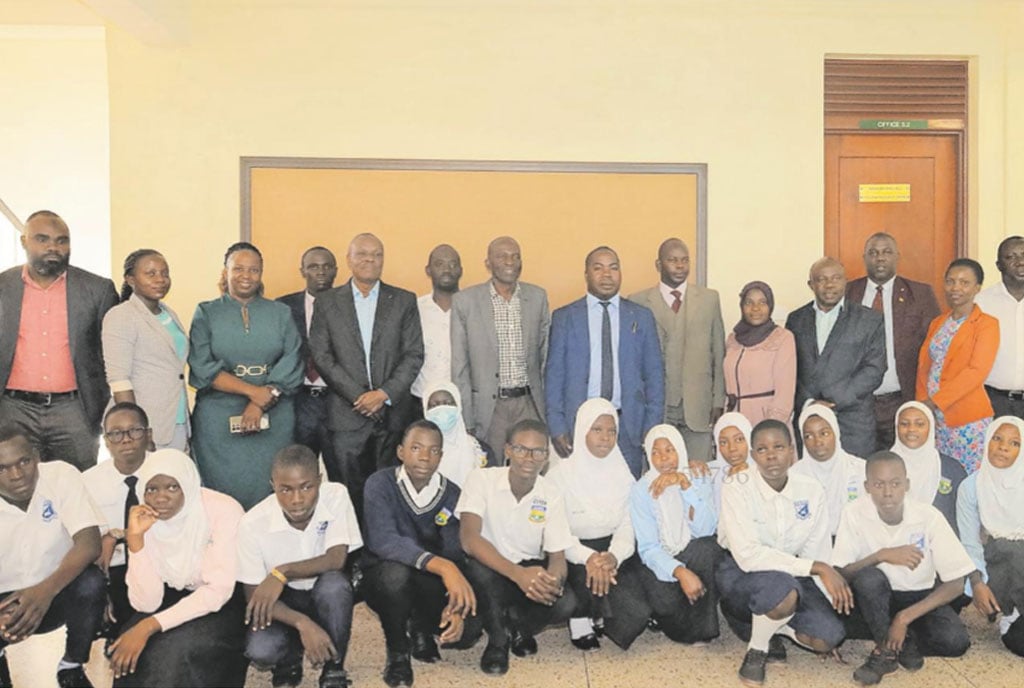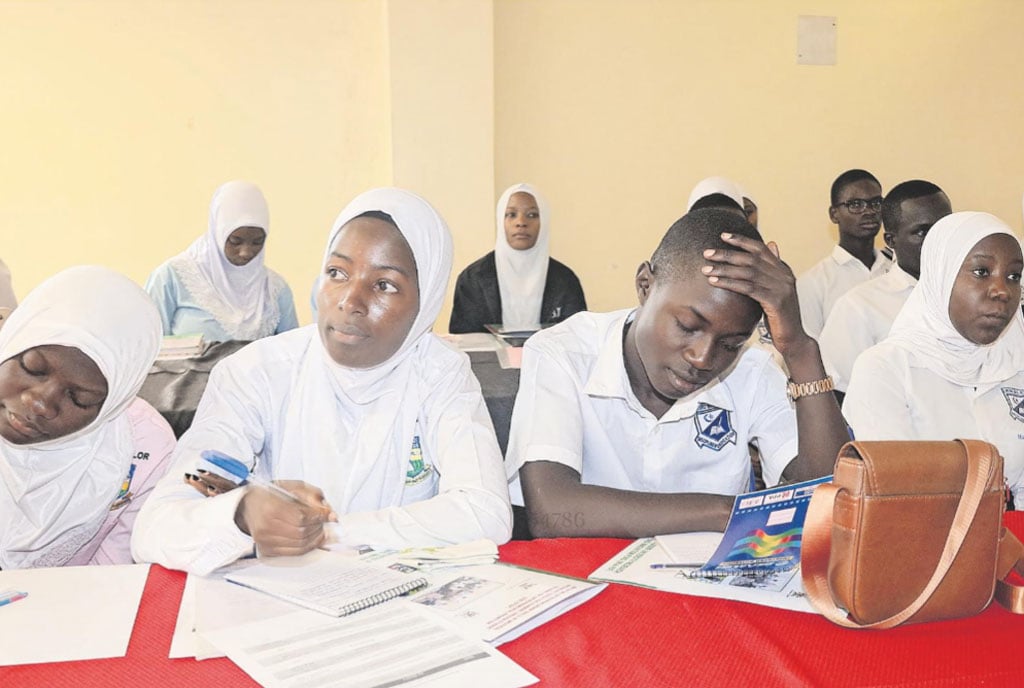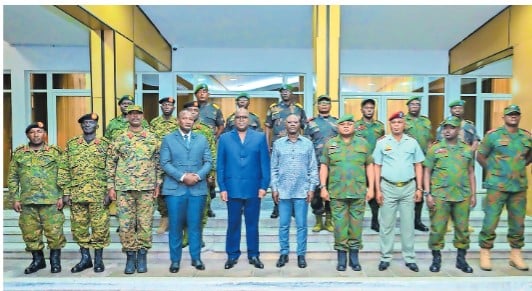Students get business skills

Some of the students, teachers and Makerere University staff after the dissemination workshop. PHOTOS/NOELINE NABUKENYA
What you need to know:
- Secondary school students are undergoing an entrepreneurship programme which equips them with skills beyond class knowledge.
At least 400 students from four Universal Secondary Education (USE) schools have been skilled to address poverty through income-generating projects to elevate their living standards.
The training is designed to combat rising youth unemployment by equipping young people with the action, knowledge, skills and progressive attitude they need to start up and successfully manage their own businesses as a viable employment option.
“Majority of those students do not go beyond Senior Four and that is a good target group,” said Mr Badru Musisi, a research investigator, revealing that the training was informed by research findings that most students who attain their education from USE schools are from underprivileged backgrounds.
Background
Student beneficiaries were from Mityana SS and Nakanyonyi SS in Mukono who trained in the 2021/2022 financial year during the first cohort, while Lweru SS, Buikwe, and Bombo Secondary School in Luwero trained in the 2023/2024 cohort.
Mr Musisi and his fellow scholars, Ms Rebecca Nambi, a lecturer at Makerere University, embarked on a project titled “Imparting Entrepreneurship Skills in Universal Secondary Education Schools through Student Training for Entrepreneurial Promotion.”
Through the project sponsored by the Government of Uganda through Makerere University Research and Innovation Fund (Makrif), these scholars equipped students with soft skills needed to start up a business and empowered them with starting capital, which they were asked to return upon making profits.
“We train them for 12 weeks with skills of how to identify viable business opportunities, and start micro-businesses,” he explained.
Those who lost their capital were tipped on the challenges in the entrepreneurial journey and were helped to identify their mistakes so that when they start businesses later, they can avoid such mistakes.
The training is in line with the government skilling programmes but these scholars said they do not address the needs of the competent world since they focus more on hard skills.
This Student Training for Entrepreneurial Promotion (STEP) project provides soft skills which change the mindset of young people.
“Youth are trained and given equipment and end up selling them instead of doing business. This is because they are not psychologically prepared,” Mr Musisi explained.
The training provided by these scholars comprises three areas, psychology, entrepreneurship and business administration. Students are trained on how to manage failure and challenges.
According to this research, out of 100 students skilled under the government skilling programmes, only 20 percent can run businesses after training.
“These students who enroll for tailoring, plumbing, carpentry among other courses, end up looking for jobs, yet the point is self-employment,” he said.
Teachers were the first to receive this training and in turn, trained their students.
Criteria for selecting students
Researchers approached schools asking them to scale up their students, but many turned down the opportunity, citing their busy schedules.
The four schools selected 100 students each, who were divided into two groups, and those students were asked to make 10 groups of five students each.
“As Makerere University, we do not have the capacity to train students, so, we use the trainee of trainers approach and with this model, at least 40 teachers have been trained,” said Ms Nambi.
During the 12 weeks of this training, students were given time to identify the businesses they wanted to do, but they were advised not to copy each other.
Each group consisting of five members was given Shs300,000 as start-up capital. All of them were able to multiply profits and return the money.
“One group claimed to have lost their capital and remained with only Shs50,000,” Mr Musisi recounted, giving them advice to look for a business that fits in that capital.
The team resolved to buy jackfruits from the nearby communities, sold them to teachers and their peers. During the monitoring exercise, they earned Shs400,000 profits a few weeks later.
Beneficiaries
The training has changed the lives of these students, and some have even started up businesses at home.
Faizo Jjingo, a Senior Three student from Bombo SS, acquired marketing skills from the training. He started up a juice business where he generates money for his basic needs.
“I don’t regret joining this training because it opened my eyes to see an opportunity in every challenge in my community,” he testified.
For Christine Nayiga from Lweru SS, she ventured into poultry and she is committed to investing more money in her business to expand it to serve local communities in her area.
Plea and plans
The training was conducted in central region districts due to limited funding, but if the government provides more funding, the investigators plan to roll it out across the country.
Since inception, Shs300 million has been injected into this project.
Issa Nsubuga, another student from Lweru SS, asked the investigators to extend the training to local communities and upskill school dropouts who are idle.
On behalf of Makerere University Research and Innovation Fund, Ms Juliet Nabirye, pledged the commitment of Makrif towards realising ideas of young people, and expressed commitment of fundingt where possible.
She asked students to apply the skills by branding their products to be able to stand out in the competitive world.
“Identify challenges and find solutions to them. Continue with these projects even when you are at home and also endeavour to train your fellow children who are unable to get the opportunity,” she encouraged beneficiaries.
Mr Abdul Nsereko, an education officer in Luwero, urged students to continue with their businesses wherever they go.
He emphasised that with self-employment the entrepreneur direct ly manages their businesses, thus no corruption.
“We are in a world where we are encouraged to do multiple jobs. You can start up your side businesses alongside the professional jobs to double your incomes,” he noted.
Mr Hamza Ssebunya, the head teacher Lweru SS, Buikwe, said the project has changed their mindset and students can now start up businesses which will hep them become more self-reliant easing their parents’ worries.
Mr David Kabugo, deputy director Makerere University Institute of Teacher Education and Research (MITER), believes unemployment shall be history with this initiative.
“We are all aware of the crisis of unemployment in the country. The background of this project is a realisation that about 64 percent of the youth are unemployed,” he highlighted.
Mr Kabugo noted that the skills are responding to the need of having a population with the ability to identify business opportunities and practically do business.
Challenges
Schools have stopped learners from going on with their businesses after the training because these businesses disrupt students’ studies.
Some teachers believe that if students are left to pursue these businesses, they will stop coming to class which will be a big blow to their future.




